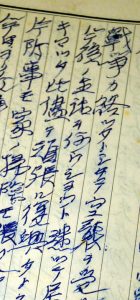Documenting Hiroshima of 1945: August 15, “Ah, the war has come to an end”
Aug. 15, 2024
Confusion and deep sorrow
by Minami Yamashita, Staff Writer, and Kyosuke Mizukawa, Senior Staff Writer
At noon on August 15, 1945, Nobuo Ito, 17 at the time, was situated in front of a radio at the Japan Army Marine Training Division in the area of Ujina-machi in Hiroshima City (in the city’s present-day Minami Ward). Mr. Ito, who is now 96 and lives in Tono City, Iwate Prefecture, was a young soldier in the Army’s Ship Communications Reserve. He had entered the devastated central area of Hiroshima on August 6 to engage in relief operations and the cremation of dead bodies.
Some of the wounded had also gathered around the radio with assistance and listened to the emperor’s announcement declaring the end of the war. Mr. Ito was not able to hear all of the details, but someone said after the broadcast, “The war is over.” Mr. Ito thought, “How ridiculous. Now is the time for our decisive battle to defend the homeland.” For a time he remained skeptical about the news.
Accepting defeat calmly
People other than soldiers were also perplexed. Yutaka Amatsu, eight at the time, who died in 2013 at the age of 76, had been evacuated from the city to the village of Kameyama (in Hiroshima’s present-day Asakita Ward). On that day, Mr. Amatsu wrote in his illustrated journal, “I always had thought I wanted to be a soldier when I grew up and vanquish the enemy.” He had lost his grandmother in the atomic bombing.
Meanwhile, some of those who had become adults before a strict system of militaristic education was established during the war accepted the loss calmly. Chojiro Tsutsumi, 66 at the time, who was a physician in the city, wrote the following in his journal titled “Writings about A-bombing medical treatment, August 1945.”
In his journal entry dated August 15, he wrote, “Enemy aircraft, which always used to fly noisily over us, don’t come. Ah, the war has come to an end. If the war is truly over, we don’t need to worry about air raids.”
Mr. Tsutsumi experienced the atomic bombing at his home in the area of Hijiyama-honmachi (in Hiroshima’s present-day Minami Ward), located around two kilometers from the hypocenter. He suffered wounds to his head from flying fragments of broken glass. He wrote in the same journal entry, “I had been confused about what to do for a living in the future, but with that, my mind was made up. I suddenly had the courage to continue to do my best on what I had been doing and work for restoration, feeling motivated to take care of things and clean the house.”
14-year-old wrote, “Frustrating”
Everyone experienced a mix of different emotions. Mr. Ito cannot forget the bright lights shining at Ujina Port, which had been completely dark at night during the war. The lighting he said made him feel, “At least, I had to admit the war was over.” However, even if the city recovered, it would not bring back the lives of family members that had already been lost.
Yoko Fukumori, 14 at the time, who was a third-year student at Iwakuni Women’s Higher School (present-day Iwakuni High School) and died in 2016 at the age of 85, wrote in her journal entry dated August 15, “Frustrating.” Her younger sister, Nobuko Oshita, 13 at the time, who was a first-year student at Hiroshima Prefectural Hiroshima No. 1 Women’s Higher School (present-day Minami High School), experienced the August 6 atomic bombing when she was mobilized to help demolish buildings for the creation of fire lanes in the central part of the city. Nobuko was taken to the area of Otake-cho (in present-day Otake City), where their home was located, reuniting with her parents. However, she died that same day.
In her journal entry dated August 16, Yoko Fukumori wrote, “Everyone is disheartened. We only discuss the ending of the war … My mother shed tears, saying ‘If Nobuko had been able to live a bit longer, everything would have been fine because the war would have been over. Because she’s gone, I don’t have anything to live for.” Excerpts from Ms. Fukumori’s journal entry of August 16 bring into relief the family’s grief.
At the closing stage of the war, which the Japanese government fought with all its people, the U.S. military dropped the atomic bombs. The bombs brought about sorrow and bitterness felt by many citizens, which could not be erased by the broadcast announcing the end of the war.
(Originally published on August 15, 2024)








